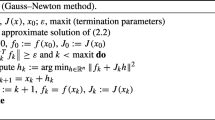Abstract
The approximate linear equation \(Ax\approx b\) with some columns of A error-free can be solved via mixed least squares-total least squares (MTLS) model by minimizing a nonlinear function. This paper is devoted to the Gauss–Newton iteration for the MTLS problem. With an appropriately chosen initial vector, each iteration step of the standard Gauss–Newton method requires to solve a smaller-size least squares problem, in which the QR of the coefficient matrix needs a rank-one modification. To improve the convergence, we devise a relaxed Gauss–Newton (RGN) method by introducing a relaxation factor and provide the convergence results as well. The convergence is shown to be closely related to the ratio of the square of subspace-restricted singular values of [A, b]. The RGN can also be modified to solve the total least squares (TLS) problem. Applying the RGN method to a Bursa–Wolf model in parameter estimation, numerical results show that the RGN-based MTLS method behaves much better than the RGN-based TLS method. Theoretical convergence properties of the RGN-MTLS algorithm are also illustrated by numerical tests.






Similar content being viewed by others
Data Availability
All data generated or analysed during this study are included in this manuscript.
References
Arun, K.S., Huang, T.S., Blostein, S.D.: Least-squares fitting of two 3-D point sets. IEEE Trans. Pattern Anal. Mach. Intell. PAMI 9(5), 698–700 (1987)
Bai, Z.Z., Wu, W.T., Muratova, G.V.: The power method and beyond. Appl. Numer. Math. 164, 29–42 (2021)
Björck, Å.: Numerical Methods for Least Squares Problems. SIAM, Philadelphia (1996)
Chen, J.H., Li, W.G.: Convergence of Gauss–Newton’s method and uniqueness of the solution. Appl. Math. Comput. 170, 686–705 (2005)
Daniel, J.W., Gragg, W.B., Kaufman, L., Stewart, G.W.: Reorthogonalization and stable algorithms for updating the Gram–Schmidt QR factorization. Math. Comput. 30, 772–795 (1976)
Fasino, D., Fazzi, A.: A Gauss–Newton iteration for total least squares problems. BIT Numer. Math. 58, 281–299 (2018)
Golub, G.H., Van Loan, C.F.: An analysis of the total least squares problem. SIAM J. Numer. Anal. 17(6), 883–893 (1980)
Golub, G.H., Van Loan, C.F.: Matrix Computations, 4th edn. Johns Hopkins University Press, Baltimore (2013)
Golub, G.H., Hoffman, A., Stewart, G.W.: A generalization of the Eckart–Young–Mirsky matrix approximation theorem. Linear Algebra Appl. 88(89), 322–327 (1987)
Han, F., Wei, Y.: TLS-EM algorithm of mixture density models for exponential families. J. Comput. Appl. Math. 403, 113829 (2022)
Hochstenbach, M.E., Reichel, L.: Subspace-restricted singular value decompositions for linear discrete ill-posed problems. J. Comput. Appl. Math. 235, 1053–1064 (2010)
Li, C., Zhang, W.H., Jin, X.Q.: Convergence and uniqueness properties of Gauss–Newton’s method. Comput. Math. Appl. 47, 1057–1067 (2004)
Liu, Q.H., Wang, M.H.: On the weighting method for mixed least squares-total least squares problems. Numer. Linear Algebra Appl. 24(5), e2094 (2017)
Liu, Q.H., Li, C.G., Wei, Y.M.: Condition numbers of multidimensional mixed least squares-total least squares problems. Appl. Numer. Math. 178, 52–68 (2022)
Nocedal, J., Wright, S.J.: Numerical Optimization. Springer, Berlin (1999)
Paige, C.C., Wei, M.S.: Analysis of the generalized total least squares problem \(AX \approx B\) when some columns are free of errors. Numer. Math. 65, 177–202 (1993)
Stoica, P., S\(\ddot{\rm o}\)derstr\(\ddot{\rm o}\)m, T.: Bias correction in least squares identification. Int. J. Control 35, 449–457 (1982)
Van Huffel, S., Vandewalle, J.: Analysis and properties of the generalized total least squares problem \(AX \approx B\) when some or all columns in \(A\) are subject to error. SIAM J. Matrix Anal. Appl. 10, 294–315 (1989)
Van Huffel, S., Vandewalle, J.: Comparison of total least squares and instrumental variable methods for parameter estimation of transfer function models. Int. J. Control 50, 1039–1056 (1989)
Van Huffel, S., Vandewalle, J.: The Total Least-Squares Problems: Computational Aspects and Analysis. Frontiers in Applied Mathematics, vol. 9. SIAM, Philadelphia (1991)
Wolf, P.R., Ghilani, C.D.: Adjustment Computations: Statistics and Least Squares in Surveying and GIS. Wiley, New York (1997)
Wu, Y., Li, M.F., Wang, C., Song, W.T.: Application of scaled total least squares in coordinate transformation. Geomat. Spatial Inf. Technol. 38, 45–47 (2015). ((in Chinese))
Young, P.: The instrumental variable method: a practical approach to identification and parameter estimation. IFAC Proc. 18(5), 1–15 (1985)
Zare, H., Hajarian, M.: An efficient Gauss–Newton algorithm for solving regularized total least squares problems. Numer. Algorithms 89, 1049–1073 (2022)
Zhang, P.P., Wang, Q.: Perturbation analysis and condition numbers of mixed least squares-scaled total least squares problem. Numer. Algorithms 89, 1223–1246 (2022)
Acknowledgements
The authors are grateful to the handling editor and the anonymous referees for their useful comments and suggestions, which greatly improved the original presentation.
Author information
Authors and Affiliations
Corresponding author
Ethics declarations
Conflict of interest Statement
The authors declare that they have no conflict of interest.
Additional information
Publisher's Note
Springer Nature remains neutral with regard to jurisdictional claims in published maps and institutional affiliations.
Q. Liu is supported by Natural Science Foundation of Shanghai under Grant 23ZR1422400 and Large-scale Numerical Simulation Computing Sharing Platform of Shanghai University. Y. Wei is supported by the Science and Technology Commission of Shanghai Municipality under Grant 23JC1400501 and the Ministry of Science and Technology of China under Grant G2023132005L.
Rights and permissions
Springer Nature or its licensor (e.g. a society or other partner) holds exclusive rights to this article under a publishing agreement with the author(s) or other rightsholder(s); author self-archiving of the accepted manuscript version of this article is solely governed by the terms of such publishing agreement and applicable law.
About this article
Cite this article
Liu, Q., Wang, S. & Wei, Y. A Gauss–Newton method for mixed least squares-total least squares problems. Calcolo 61, 18 (2024). https://doi.org/10.1007/s10092-024-00568-2
Received:
Revised:
Accepted:
Published:
DOI: https://doi.org/10.1007/s10092-024-00568-2




